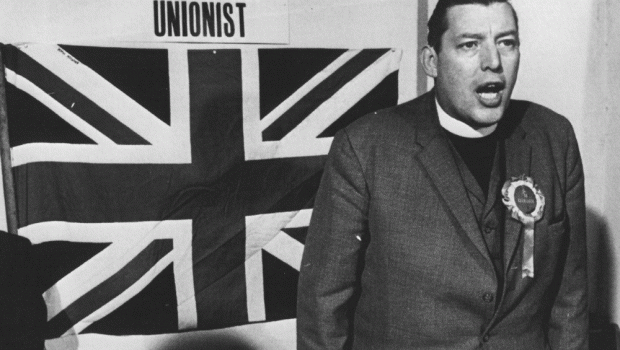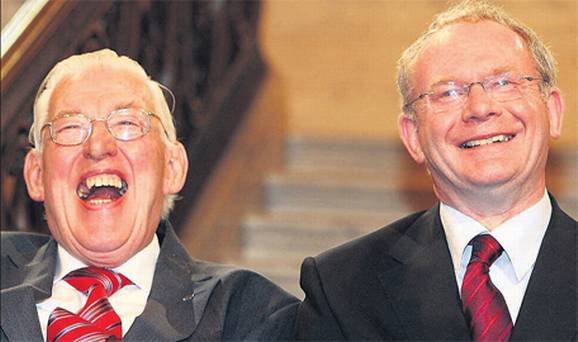Ian Paisley was a small man, and he led a small movement that forestalled peace in Northern Ireland for decades, withholding from Protestant and Catholic families alike the economic and social progress that accrued to virtually the rest of western Europe, and inflaming sectarian tribalism that still haunts Northern Ireland’s cultural fabric in the 21st century.![]()
![]()
Upon his death today at age 88, he’ll be feted as a statesman in too-long-to-read eulogies prepared long ago in The Guardian and The New York Times.
Those eulogies will note that Paisley, at age 81, finally agreed to a power-sharing agreement with Irish Republicans, making him Northern Ireland’s first minister from 2007 until his retirement in 2008. It was a decade after he opposed the 1998 Good Friday Agreement that generally ended active fighting between Northern Ireland’s Protestant loyalists and Catholic republicans. Those eulogies will show pictures of Paisley smiling and laughing with his nemesis, Martin McGuinness, the Northern Irish leader of Sinn Féin who continues to serve as Northern Ireland’s deputy first minister in a power-sharing coalition with Paisley’s successor, Peter Robinson.
They were nicknamed the ‘Chuckle Brothers,’ though it’s hard to find too much to laugh about in the deaths of over 3,500 people during three decades of fighting that tore apart families and stunted the growth of a country all in the name of religious nationalism.
Paisley’s critics argue that his 11th hour conversion to power-sharing was a cynical maneuver — with the knowledge that reverting to the violent era of the Troubles was impossible, Paisley moved to cement his Democratic Unionist Party (DUP) as the natural party of Protestant governance in Northern Ireland, displacing the more moderate Ulster Unionist Party (UUP) and David Trimble, who won the Nobel Peace Prize for his efforts to enact the Good Friday Agreement.
Cynical or not, Paisley’s late-in-life conversion is a fact, and it won’t be the first time that politicians have taken self-serving actions. In exchange for the power-sharing agreement, Paisley will be remembered today as a statesman with a peerage, not a garden-variety terrorist. That’s just politics, and Paisley made the smart move. He saw, a decade after Good Friday, that the train was well out of the station, and he jumped on at the last minute.
And so much the better for Northern Ireland that he did.
But he took a damned ugly path to get there.
Paisley’s path was certainly no more or less convenient than the manner in which McGuinness and Sinn Féin pushed aside the more moderate Social Democratic and Labour Party (SDLP) and its longtime leader John Hume, who shared the Nobel Prize with Trimble for the 1998 peace accords.
Today, in the Northern Ireland Assembly at Stormont, the DUP holds 38 seats and Sinn Féin holds 29, far outmuscling the UUP (13) and the SDLP (14), junior partners in the power-sharing government, lingering as phantoms of a different era.
But even as tributes pour in from former adversaries like Sinn Féin leader Gerry Adams (incredibly declaring Paisley the ‘no’ man who said ‘yes’), and commentators celebrate Paisley’s final act in Ulster politics, today is a day to celebrate the death of Paisleyism, even while Irish republicans memorialize the man himself.
Consider this anecdote from this otherwise amazing 1994 profile in the Independent:
And God help the Catholic priest who dared to cross his path. One who objected to Paisley’s use of Ballymoney town hall for anti-Catholic meetings provoked a typical afflatus. ‘Priest Murphy, speak for your own bloodthirsty, persecuting, intolerant, blaspheming, politic-religious papacy, but do not dare to pretend to be the spokesman of free Ulster men . . . Go back to your priestly intolerance, back to your blasphemous Masses, back to your beads, holy water, holy smoke and stinks and remember . . we know your church to be the mother of harlots and the abominations of the Earth.’
‘Holy smoke and stinks.’ Good grief.
Paisley brought to Northern Ireland politics an intolerant brand of bluster that had as little respect for constitutionalism, the rule of law, individual freedom and freedom of religion as it did for Catholicism and the Irish republican movement. He did so with the force of right-wing paramilitary units that resorted too often to violence in the 1970s and the 1980s.
He called the moderate Hume a ‘pretender to democracy,’ while his Protestant thugs were content to deny basic civil rights to Ulster Catholics.
Elected in the first direct elections to the European Parliament in 1979, Paisley won international condemnation after he was ousted from the parliament after interrupting an address by John Paul II with howls that the Pope was the ‘anti-Christ.’
That’s not to absolve his enemies. Sinn Féin and the Irish Republican Army have as much blood on their hands, and Adams, even during the last European election campaign, was handicapped by the fallout of his role in shameful murders from four decades ago.
Today, slowly, the DUP is becoming more like the Northern Irish version of the US Republican Party — a coalition of pragmatic unionists and social conservative evangelicals. One of the legacies of Paisley’s parochial worldview is that Northern Ireland is the only jurisdiction in the United Kingdom where same-sex marriage is still unrecognized. When he wasn’t fighting the Catholics, he was waging war against abortion, gay rights, blasphemy and any other demons he thought might corrode the resolve of his Free Presbyterian flock. (He launched a ‘Save Ulster from Sodomy’ campaign in 1977.)
Likewise, Sinn Féin today remains committed to republicanism, but in the Republic of Ireland, it’s become more popular as a social democratic voice against orthodox austerity policies, under a new generation of leaders like Mary Lou McDonald.
That’s all a good thing — for both Northern Ireland and the Republic of Ireland. But it took far too long to reach this point.

